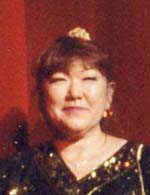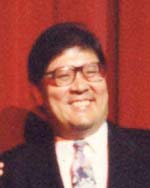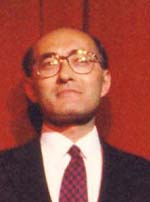
Linda Consolo
Linda Kawabe Consolo was born in Utah in 1943 after her parents left Los Angeles to avoid the internment camps. Her father, Dr. Arthur Kawabe, had been a physician with two medical offices in Los Angeles prior to the war. They moved to Utah where they had been promised work in a sugar mill, which fell through. Linda's family then found work in sugar beet and tomato fields, and lived in a one-room shack. When Dr. Kawabe was finally able to return to Los Angeles, he opened up an office in Little Tokyo where he did not get paid much for private practice but their family was “rich in family, friends, and friends of the community.” When Consolo filed for redress, she was denied by the Office of Redress Administration (ORA) and decided to fight it. She asked her cousin, lawyer Gerald Sato to represent her in what became the historic redress case of Linda Y. Consolo v. United States. In July 1995 after many court battles, the Consolo case helped win the right for redress for over 900 children of “voluntary” evacuees. Though Dr. Kawabe passed away in 1980, Consolo feels that her father would have been proud of her victory. She said, “I would rather go down fighting and lose than to have never tried.” For her tremendous fortitude in challenging the government, NCRR awards Linda Consolo the Fighting Spirit Award!

Gerald Sato was brought into the world by Dr. Kawabe, Linda Consolo's father. During the war, his mother's family was interned at Rohwer, Arkansas and Tule Lake. His father, a “voluntary” evacuee later worked for the Army's Military Intelligence Service. The experiences of his family influenced Sato's decision to pursue law and to be active in redress. During the 1981 Commission on Wartime Relocation and Internment of Civilians (CWRIC) hearings, Sato helped former internees prepare testimony. In 1987 he joined the NCRR lobby to Washington D.C., to push for passage of the Civil Liberties Act. When his cousin, Linda Consolo asked him to represent her, he was with the Ventura County law firm of Sato & Henry. Sato argued in the U.S. Court of Federal Claims that Consolo was deprived of liberty when she was excluded from her parents' original place of residence as the result of Executive Order 9066. Around the same time, a parallel case was being heard about Douglas Ishida, also a child of “voluntary” evacuees who had also been denied redress. Though the judge agreed with the Consolo case, the Department of Justice appealed. Eventually in July 1995, the court cases of both Consolo and Ishida had victories. Sato said he went into law because of his belief in justice. “You get this vision of it and you just can't let go of it. And not to take cases that help fulfill that vision is unthinkable.” For his historic victory in Linda Y. Consolo v. United States, NCRR awards Gerald Sato the Fighting Spirit Award!

Bruce Iwasaki has been involved in fighting for justice for over 25 years. As a UCLA student in the 1960s, he helped counsel young men on the military draft. He was active in the Little Tokyo People's Rights Organization (LTPRO) and a founding member of NCRR. During the 1981 Commission on Wartime Relocation and Internment of Civilians (CWRIC) hearings, he helped former internees prepare testimony. Iwasaki is a lawyer with the prestigious law firm of O'Melveny & Myers, and a member of the Japanese American Bar Association (JABA). Iwasaki was honored by the American Civil Liberties Union (ACLU) for his work in fighting Proposition 187, which unfairly discriminated against minorities. Iwasaki provided legal advice to NCRR and helped to coordinate attorney involvement with growing numbers of cases being denied redress. After the Department of Justice appealed the Consolo case, attorneys Bruce Iwasaki and John Daum wrote the amicus curiae (“friend of the court”) brief which swayed the U.S. Court of Appeals for the Federal Circuit to affirm Judge Turner's decision. At the same time, it reversed a ruling in the similar case of Douglas Ishida, denied redress by a lower court. These victories allowed over 900 children of “voluntary” evacuees to be eligible for redress and opened the door to potentially thousands currently denied redress. For his role in this historic victory, NCRR awards Bruce Iwasaki the Fighting Spirit Award!